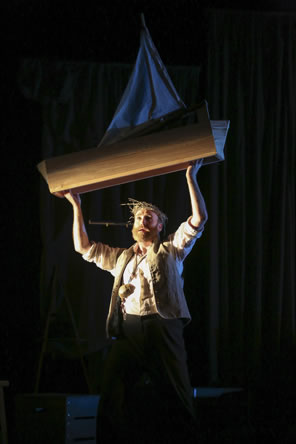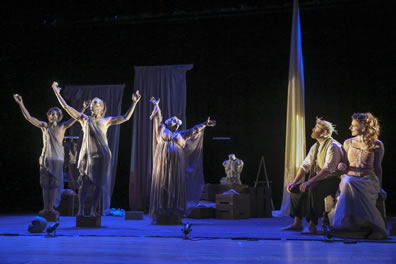The Tempest
Will the Real Prospero Please Stand Up
Aquila Theatre, George Mason University's Center for the Arts, Fairfax, Va.
Friday, January 23, 2015, U–16&17 (last row orchestra—right next to the light board)
Directed and adapted by Desiree Sanchez

Prospero (James Lavender) holds aloft a model of a ship as he conjures up the storm at the opening of Aquila Theatre's touring production of William Shakespeare's The Tempest. Photo by Richard Termine, Aquila Theatre.
When we enter the theater, Prospero is sitting on the stage in front of the curtain, a giant book open on his lap. Sometimes he’s writing in the book, sometimes he's contemplating something up in the balcony, sometimes he's rubbing his head as with worry or a nagging headache. A little wooden boat sits on the floor in front of him.
As the sound of a storm nears, the curtain rises and we find ourselves in—what, a ship with sails hanging down and the mariners in tableaux? Or is it the remnants of a shipwreck creating a home on a desert island with visions of characters past and present waiting for their cues? It looks most like a sculptor's studio with statues as the two Renaissance mariners and a woman in Grecian robes wear bronze makeup.
Of all the guesses, the last might be closest to the point of this six-actor, heavily cut Aquila Theatre touring production of William Shakespeare’s The Tempest. The professional company-in-residence at New York University’s Center for Ancient Studies was paying a one-night visit to George Mason University's Center for the Arts in Fairfax, Va., and though that first impression will guide the tenor of this review, the second impression was a damning one: we couldn't hear much of the dialogue. Venue acoustics might have been a factor, as we were sitting at the back of the proscenium-arch auditorium (this was the first show we’ve attended there); at times the actors sounded as if they were miked, other times not, so they might have been using environmental microphones. Beyond the technical reasons, though, was verse diction: a couple members of the cast were pretty much incomprehensible.
The opening scene, the shipwreck, suffered most. What can you accomplish with just six actors, especially when two of them, Prospero (James Lavender) and Miranda (Tara Crabbe), are watching the action? Director Desiree Sanchez has two of the actors pulling down the corners of one of the sheets, billowing it as we hear the shouts of mariners and royal passengers while lighting (Peter Meineck, Aquila's founder) and sound (Christopher Marc) effects create the storm (Bob Rogers is technical director). All of that shouting, however, was completely indistinguishable to us, and newcomers to the play would be lost in all the sound and fury.
In truth, this production is not recommended for the uninitiated. But for those of us who do know the play well, it is a most provocative Tempest.
Sanchez is Aquila’s artistic director and is credited as adaptor for this production in addition to its director. Most of her adaptation is in bending the 17-character play to six actors. Except for Lavender and Crabbe, the actors double roles, and Costume Designer Deanna Berg MacLean, who dresses the nobles in classic Renaissance Italian styles, uses creative accessorizing to distinguish the characters. Rupert Baldwin removes the waistcoat he wears when playing Naples' King Alonso and dons a ruff collar to become the jester Trinculo. Michael Ring, who plays Antonio, Prospero's brother and usurping Duke of Milan, merely goes bare-chested when he’s the drunk butler Stephano. Carys Lewis, who plays the spirit Arial in her Grecian gown, puts on a cape and cap to play Gonzalo (here a noblewoman of Milan). Joseph Cappellazi swaps Ferdinand’s body armor for Caliban’s ram horns. He also delivers the most engaging performance, both as the crouching, fate-beaten islander Caliban and a Marine-straight, young stud Ferdinand who hilariously finds his arms paralyzed by Prospero’s spell and ends up flopping about on the stage floor like a break-dancing tuna.
This corps also provides the voices for the mariners in the opening scene and plays the goddesses in Prospero's pageant, but all other parts are dropped. That means no Sebastian (Alonso’s brother) or other servants in Alonso's party. Antonio's conversation with Sebastian over assassinating the king becomes a soliloquy by Antonio. Sanchez also doesn't attempt any stage tricks to get all the characters represented in the final scene; she merely drops Caliban, Trinculo, and Stephano as well as the mariners from that scene altogether.
What might be choices to accommodate a cast one-third the size Shakespeare calls for might also be Sanchez’s thematic shaping, too. The action, in addition to the set, leads us in the end to ask, who is Prospero?
At the beginning, he says he is the former Duke of Milan usurped by his brother 12 years before the action of the play and set adrift on the sea with his toddler daughter Miranda. They landed on this mysterious island where Prospero perfected his practice of magic while raising his daughter. Lavender's Prospero obviously holds a mighty grudge: “Twelve year since” he repeats through gritting teeth as he explains their history to Miranda. It eats at him that he is no longer the duke, and this seems to matter more to him than his eventual mastery of magic.
The subsequent question to "who is Prospero" is what exactly is his magic? As Prospero relates their history in the play's long expository opening speech, the characters in tableaux—Antonio, Alonso, and Gonzalo—move like statue mimes as Miranda watches. In fact, she is enthralled watching Antonio when Prospero snaps at her, "Dost thou attend me?" Throughout the play, while the other characters return to various tableaux when not featured in a scene, Lavender participates in every scene, even those Shakespeare doesn’t put him in. He watches and even walks among the other characters and reacts to what's going on.

Prospero (James Lavender) and Miranda (Kali Hughes) watch the pageant of gods in Aquila Theatre's production of William Shakespeare's The Tempest. This first-cast version also featured, from left, Calder Shilling, Michael Ring, and Lizzy Dive. Photo by Richard Termine, Aquila Theatre.
Literary criticism of this play has traditionally—but in my opinion misguidedly—seen Prospero as autobiographical and The Tempest as Shakespeare's retirement announcement: the "conjuror" laying aside his staff (i.e., pen) and book with which he created visions and pageants. Sanchez does not seem to be presenting Prospero as Shakespeare, but she does perhaps use that tradition to shape her own thematic reading of the play. Rather than being a playwright, this Prospero seems to be more of a visual artist, a sculptor and painter creating characters in his studio, and Arial is his muse. It's an enticing concept, this spirit of air whom only he sees, carrying out his wishes with her ingenuity. The moment in which she turns testy and insists on her freedom even rings familiar; my muse has wanted to quit on me several times, especially when the day has grown long and the tasks ahead are still many. Later, Lewis’s Arial watches Miranda and Ferdinand canoodling before she asks Prospero, “Do you love me, master? No?” Certainly, muses can doubt our appreciation of the inspirations they bestow upon us, since we grouse so often about the toils those inspirations lead us to (though Prospero replies, “Dearly, my delicate Ariel”), but this particular blocking suggests something deeper, more mysterious than an artist and his muse: the father-daughter relationship.
In this production, Caliban assaults Miranda as she’s sleeping in the play’s second scene—after Prospero’s expository tale and while he’s conversing with Arial—and Prospero stops him, leading into their testy exchange. The same actor playing Caliban almost on the instant turns around to become Ferdinand, the prince that Prospero as doting matchmaker has manipulated into Miranda’s presence. Nevertheless, Prospero yet demands that Ferdinand prove his worth, and upon the couple’s betrothal, happy dad holds a verbal shotgun at Ferdinand’s head warning him to abstain from sex until after the wedding. This is usually played as a comical scene (or at least in a state of geniality), and it is here, yet in Lavender’s playing you sense he is futilely trying to maintain hold of that which he must let go. It’s notable that Miranda is not part of the production’s opening tableaux—she walks on stage during the storm—but she then remains a background figure during much of the play and ends up part of the final tableaux when Prospero’s crown comes off.
Ah, the crown. In the opening moments, Prospero places a crown of twigs on his head. Seems he’s ready to be Duke of Milan. Leading into the intermission, though, he takes off the crown. He places it on his head again for the second half to begin, and we start thinking this is some cute cleverness on the part of the director indicating the play might all be happening inside Prospero's mind. However, at the end when he sets Arial free, she removes the crown, kisses his forehead, and strolls slowly off the stage. Lavender then stands and delivers Prospero’s epilogue. “Now my charms are all o’erthrown, and what strength I have’s mine own, which is most faint.”
Duke of Milan? Shakespeare? Artist? Father? All of the above? Or, maybe, all of us. In Sanchez’s vision, Prospero seems to represent a man who has conjured a life that is both real and part of his imagination and is now at its end. “Release me from my bands with the help of your good hands: Gentle breath of yours my sails must fill, or else my project fails, which was to please,” he says.
This could be a stretch (by Sanchez or me, take your pick), except that the production’s dramatic highlight comes in Prospero’s famous “We are such stuff as dreams are made on” speech. Lavender rises to the occasion, making the occasion rise to deeper meaning than I’ve ever considered before. Derek Jacobi, who played Prospero in a Royal Shakespeare Company production, once described this speech as Shakespeare, perhaps a real time traveler, describing the end of the world as a nuclear holocaust that leaves “not a rack behind” (though, in fact, a rack, or cloud, is all that would be left behind). While Prospero-as-Shakespeare adherents grab hold of the speech’s “great globe itself” line as a clue (a pun on the Globe, Shakespeare’s outdoor theater, though he might have written The Tempest specifically for his indoor theater), I tend toward Jacobi’s reading, especially as it accounts for the phrase “the cloud-capped towers.” What towers were tall enough in Shakespeare’s time to be cloud-capped?
In Lavender’s performance, Prospero is describing a moment if not at hand then soon, for him (whether he is a 16th century duke or a 21st century artist), and for us, too. It points to the fragility of a man made on dreams, whose “little life is rounded with a sleep,” and of mankind and this great globe we inhabit, furnished with little more than the baseless fabric of our imaginations, all of which shall dissolve and melt into air.
Into thin air.
Eric Minton
January 30, 2015
Comment: e-mail editorial@shakespeareances.com
Start a discussion in the Bardroom



 Find additional Shakespeareances
Find additional Shakespeareances